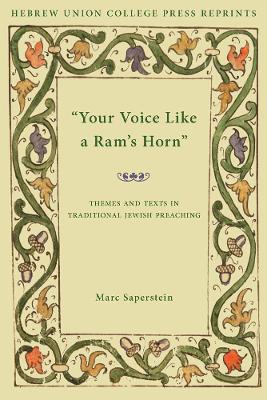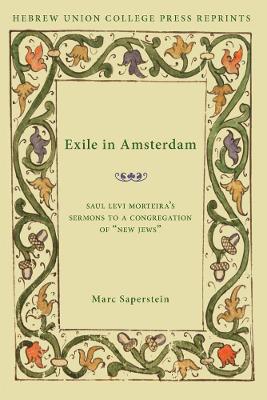Monographs of the Hebrew Union College
2 primary works
Book 18
The eighteen studies in this book continue the exploration of the Jewish sermon Saperstein began in his groundbreaking Jewish Preaching 1200-1800. His new research further illustrates the importance of this genre, largely ignored by modern scholarship, as an indispensible resource for understanding Jewish history, spirituality, and thought from the High Middle Ages to the beginning of the Emancipation in Europe. Saperstein's thematic studies explore the most important occasions for traditional rabbinic preaching: the Days of Awe and the Passover season. Two studies focus on the homiletical exegesis of classical Jewish texts, and two deal with the historical interaction of Christians and Jews. Saperstein discusses the diffusion of philosophical ideas through homiletics and identifies central conceptual issues presented in the Italian Jewish pulpit. Other essays include a critical analysis of the work of Saul Levi Morteira of Amsterdam, an examination of sermons in eighteenth-century Prague for indications of a traditional community in crisis, and homiletical evidence for a developing sense of patriotic identification with the state, even before Emancipation changed the legal status of the Jews. Saperstein also presents newly discovered sermonic texts in order to explore a full panoply of issues relating to historical context and genre. All are published for the first time with his annotated translation accompanying the Hebrew original. Included are a Guide for Preachers, sermons on repentance and on the Binding of Isaac, and three eulogies, the last a fascinating memorialization of the antisemitic empress Maria Theresa.
Book 32
Exile in Amsterdam is based on a rich, extensive, and previously untapped source for one of the most important and fascinating Jewish communities in early modern Europe: the sermons of Saul Levi Morteira (ca. 1596-1660). Morteira, the leading rabbi of Amsterdam and a master of Jewish homiletical art, was known to have published only one book of fifty sermons in 1645, until a collection of 550 manuscript sermons in his own handwriting turned up in the Rabbinical Seminary of Budapest. After years of painstaking study from microfilms and three trips to Budapest to consult the actual manuscripts, Marc Saperstein has written the first comprehensive analysis of the historical significance of these texts, some of which were heard by the young Spinoza.
Saperstein reviews the broad outlines of Morteira's biography, his treatment by scholars, and his image in literary works. He then reconstructs the process by which the preacher produced and delivered his sermons. Morteira's sermons also provide a trove of information about individuals and institutions in Morteira's Amsterdam, enabling Saperstein to analyze the shortcomings of behavior and the lapses in faith criticized by the preacher. The sermons also presented an ongoing program of adult education that transmitted the Jewish tradition on a high yet accessible level to a congregation of new Jews-immigrants who had lived as Christians in Portugal and were now assuming a Jewish identity with minimal prior knowledge. Here Saperstein focuses on themes Morteira considered crucial: memories of the historical past, confrontations with Christianity, ideas of exile and messianic redemption, and attitudes toward the New Christians who remained in Portugal.
These historical reflections on Amsterdam's community of new Jews are illustrated by eight of Morteira's sermons, which Saperstein presents in English and with full annotation for the first time. Exile in Amsterdam offers those interested in European Jewish history and homiletics access to primary source documents and the scholarship of one of the premier historians of Jewish preaching.
Saperstein reviews the broad outlines of Morteira's biography, his treatment by scholars, and his image in literary works. He then reconstructs the process by which the preacher produced and delivered his sermons. Morteira's sermons also provide a trove of information about individuals and institutions in Morteira's Amsterdam, enabling Saperstein to analyze the shortcomings of behavior and the lapses in faith criticized by the preacher. The sermons also presented an ongoing program of adult education that transmitted the Jewish tradition on a high yet accessible level to a congregation of new Jews-immigrants who had lived as Christians in Portugal and were now assuming a Jewish identity with minimal prior knowledge. Here Saperstein focuses on themes Morteira considered crucial: memories of the historical past, confrontations with Christianity, ideas of exile and messianic redemption, and attitudes toward the New Christians who remained in Portugal.
These historical reflections on Amsterdam's community of new Jews are illustrated by eight of Morteira's sermons, which Saperstein presents in English and with full annotation for the first time. Exile in Amsterdam offers those interested in European Jewish history and homiletics access to primary source documents and the scholarship of one of the premier historians of Jewish preaching.

